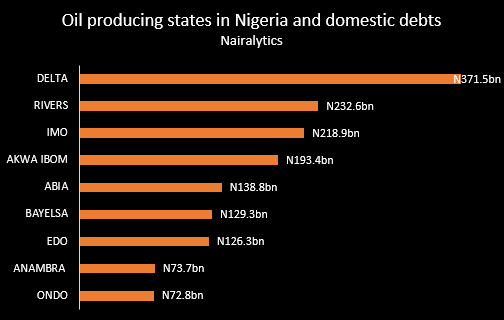The nine oil-producing states in Nigeria saw their domestic debt stock drop from a record high of N1.66 trillion recorded as of June 2023 to N1.58 trillion by the end of September 2023.
This represents a decline of N107.6 billion in three months.
This is according to an analysis by TheWitness research on the debt profile as released by the Debt Management Office (DMO).
This is as the nine states received a sum of N127.7 billion as a 13% oil derivatives fund from the federal government in the same period, a sharp decline from the N249.6 billion received in the previous quarter.
The DMO had reported that Nigeria’s debt profile increased slightly from N87.38 trillion recorded as of June 2023 to N87.91 trillion by the end of the third quarter, largely driven by increased domestic federal government borrowings.
A breakdown of the data by the DMO revealed that federal government domestic debt rose from N48.31 trillion to N50.19 trillion in the review period, while state debt including the Federal Capital Territory dropped marginally from N5.81 trillion to N5.744 trillion.
External debt, on the other hand, declined from $43.16 billion to $41.59 billion in the period under review, following the redemption of $500 million Eurobond and the payment of $413.86 million as first principal repayment of the $3.4 billion loan from the IMF in 2020.
Further analysis revealed that on a year-to-date basis, the nine states’ domestic debt profile increased by N88.69 billion, with Delta State owning the largest from the list.
Amongst the nine states, Delta State recorded the highest domestic debt profile as of September 2023, at N371.5 billion, accounting for 24% of the total.
The State, on the other hand, recorded the highest decline in terms of nominal value, as it dropped by N93.92 billion from N465.4 billion recorded in the previous quarter.
Delta State received N44.52 billion as part of the 13% oil derivative from the federal government in the same period.
Rivers State followed with a domestic debt profile of N232.58 billion, representing an increase of N7.07 billion from N225.51 billion recorded as of June 2023 and accounting for 15% of the total domestic debt stock of the nine states. Rivers State received N23.16 billion from the federal government as an oil-producing state in the review period.
Imo State accounted for 14% of the total domestic debt stock of the states under consideration with N218.9 billion, having reduced its debt profile by N1.94 billion in three months from N220.84 billion as of the previous quarter.
In terms of the 13% oil derivative fund, Imo State received a sum of N1.46 billion from the federal government.
Akwa Ibom State, with a total domestic debt of N193.45 billion, has the fourth highest debt profile of the nine states, accounting for 12% of the total.
The state’s domestic debt declined by N6.13 billion from N199.58 billion recorded as of June 2023. Akwa Ibom received N24.63 billion from the federal government for crude oil exploration in the state.
Others and their domestic debts are given in descending order; Abia (N138.78 billion), Bayelsa (N129.33 billion), Edo (N126.26 billion), Anambra (N73.72 billion), and Ondo (N72.75 billion).

The commendable reduction in the domestic debt of Nigerian oil-producing states signifies an enhanced capacity to settle loans, particularly amid fiscal challenges faced at both the state and federal levels.
Nonetheless, it is crucial for state governments to establish a comprehensive framework aimed at boosting internally generated revenue. This strategy would not only spur development within the state but also guide additional loan allocations toward essential infrastructural projects that contribute to overall state improvement.








